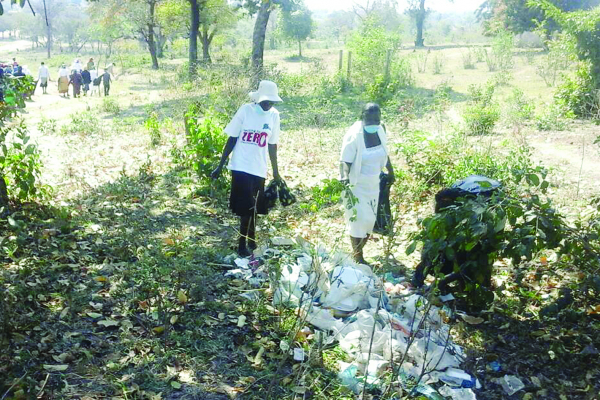
NOT so long ago, many people living with HIV had challenges in disclosing their status, something that often led to societal backlash and family ostracisation.
BY HAZVINEI MWANAKA
Yet now, Zimbabwe National Network for People Living with HIV (ZNNP+) chairperson for Zaka district, Constancia Makuvise, says support groups in her area have gone past discrimination challenges.
“Members of our support groups are now very strong. Support groups offer psychosocial needs as a way of treatment and care for people living with HIV (PLWHIV),” Makuvise, who is also a member of 15 support groups in the area, said.
“You will then find that from these meetings, members become refreshed and feel at ease.”
She was speaking recently on the sidelines of a clean-up campaign held under the theme Cleaning the Environment the Pathway to Sanity, Linking Environmental and Health Issues at Bota Rural Hospital in Zaka.
Each support group consists of 15 or more members.
“We have embarked on a clean-up campaign and we have established one at Bota Rural Hospital, which has a catchment of about five wards, where most of our support group members receive their treatment,” she said.
- Chamisa under fire over US$120K donation
- Mavhunga puts DeMbare into Chibuku quarterfinals
- Pension funds bet on Cabora Bassa oilfields
- Councils defy govt fire tender directive
Keep Reading
“We just want to show the communities that we can do things on our own. Some people in the communities believe that PLWHIV cannot do community activities, so today was just proving that we are all the same and we can, as well, do what others who are not living with HIV are doing.”
Group members usually meet and teach each other the importance of adherence (to the treatment regime), diet and engaging in projects such as market gardening and poultry.
Not all people in the support groups are HIV positive.
“Apart from cleaning the hospital and the neighbouring growth point, the support group members also contributed and cooked traditional food, which are high in nutrition. It’s also an opportunity to some of our members to be taught how to prepare these dishes,” Makuvise said.
She, however, said some of the members have challenges in enduring the long distance walk to Bota Rural Hospital.
“We appeal to the responsible authorities to construct some more clinics because some of our members walk for around 8km to collect their treatment and not all of them have the ability to pay for transport,” Makuvise said.
According to the World Health Organisation (WHO), support groups help in addressing retention and adherence to PLWHIV.
Another member, Mudavanhu Machaya (56), a village head in ward 30 under Chief Bota, said support groups had come as a relief to many PLWHIV in the area.
“To us, PLWHIV support groups are a means that provides us with healing ways to a number of challenges that we face. We get new ways to handle challenges, how to cope with the challenges and maintain new behaviours,” he said.
Vongai Muromo (43), from Gwindingwi village in Ward 28B in Zaka, who is also a village health worker (VHW), said support groups offered an opportunity for the VHWs to provide information to PLWHIV.
“It’s actually difficult for us to reach each and every person living positively in the area, so when the support groups meet, we then take advantage by encouraging them to adhere to their medication,” she said.
Muromo oversees five villages with more than 200 members.
“Support groups are an informal support outside professionals, family and friends and they provide understanding for people experiencing similar life events,” she said.
Zimbabwe National Network of PLWHIV Masvingo provincial co-ordinator, Morgen Changamire said the clean-up campaign was designed to enhance positive living for PLWHIV.
“It was meant to raise environmental awareness ensuring that the environment is safe, clean and healthy, at the same time raising awareness on positive living among PLWHIV through uptake of Art treatment [anti-retroviral treatmen], adherence to Art medication, uptake of cheap locally available foods and the importance of counselling, psychosocial support and stigma and discrimination reduction,” he said.
Changamire added that ZNNP+’s mandate was to lobby and advocate for the rights of PLWHIVs as well as co-ordinating the interest and activities for networks and support groups.
“Support groups, as a counselling and psychosocial support unit, play a pivotal role in addressing psychosocial problems for support group members, hence, it helps to enhance positive living behaviours for PLWHIV,” he said.
Research shows that participating in support groups for PLWHIV benefits the individual in reducing psychological distress both in PLWHIV and in other chronic illness.











